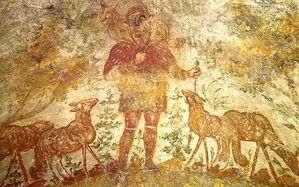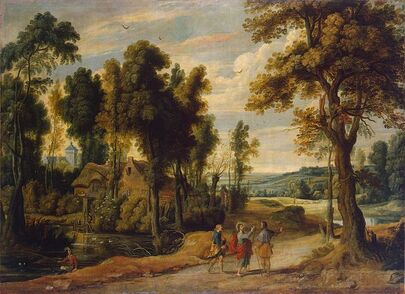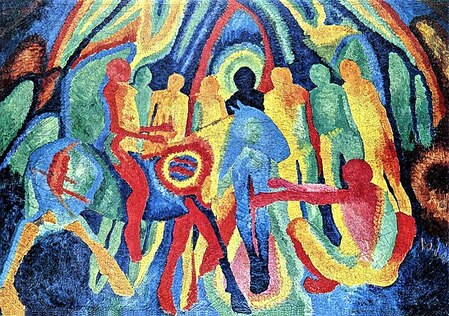 Public Domain, https://commons.wikimedia.org/w/index.php?curid=508911 Public Domain, https://commons.wikimedia.org/w/index.php?curid=508911 Sounds of spring. Words of comfort from the Good Shepherd through the ages. Two chorale preludes and a bit of Vivaldi. The Irish tune Saint Columba is often associated with the hymn text "The King of Love My Shepherd Is," a lovely paraphrase of Psalm 23 by Henry Baker (1868.) The tune receives a florid interpretation by British composer Robin Milford during the prelude. Interestingly, this setting was also adapted for an orchestral version in an episode of the original Star Trek series. The postlude is an energetic and joyous Toccata on the Easter hymn "Come, Ye Faithful, Raise the Strain" (tune: Gaudeamus Pariter) from James Biery's collection Three for Easter. The musical offering is movement one from the "Spring" portion of Antonio Vivaldi's infamous concerto Four Seasons. Violinist Harmony Tucker joins us for this well-known excerpt here in the heart of springtime.
0 Comments
 By Jan Wildens - Hermitage, Public Domain, https://commons.wikimedia.org/w/index.php?curid=5925558 By Jan Wildens - Hermitage, Public Domain, https://commons.wikimedia.org/w/index.php?curid=5925558 The Road to Emmaus. A pilgrim's tale. Where Christ is made known in the breaking of the bread. Two Easter season chorale settings will frame this Sunday morning's worship time. "Vruechten" was originally a 17th century Dutch folk tune and a love song. It soon after became an Easter carol with the text "This Joyful Eastertide" becoming most associated with the tune. James Biery's contemporary setting evokes the Baroque era with an ornamented melody overlayed a florid accompaniment. The tune "Victory" was composed by Palestrina in 1591, commonly known as "The Battle Is O'er; the Strife Is Done." Alfred Fedak offers an improvisatory and exhilarating setting of this classic Easter hymn. For the musical offering, Charles Callahan's jazz-inflected rendition of the famous communion song "Let Us Break Bread Together" will be presented.  By Breanna Galley breannagalley - https://unsplash.com/photos/0MfhbUaGT60archive copyImage, CC0, https://commons.wikimedia.org/w/index.php?curid=61843604 By Breanna Galley breannagalley - https://unsplash.com/photos/0MfhbUaGT60archive copyImage, CC0, https://commons.wikimedia.org/w/index.php?curid=61843604 On this Second Sunday of Easter, we reflect upon our role as stewards of this island home called Earth. So let us have an environmental sabbath day with music celebrating nature, the Resurrection, and new life. The familiar tune of the ecological hymn "All Things Bright and Beautiful" receives a whimsical and playful treatment by esteemed composer Emma Lou Diemer. An excerpt from her Folk Hymn Sketches for Organ, this brief character piece begins with a chirpy registration (perhaps alluding to morning bird chatter?), transitions to sonorous timbres in the verses ("The purple-headed mountain..."), and back to the cheerful refrain. Soprano Blair Carpenter will present a solo interpretation of the choral anthem "Trust the Seeds" by Elizabeth Alexander. On this Sunday in Eastertide, we often will hear the story of doubting Thomas: the disciple in need of proof of Jesus' resurrection as faith alone would not do. Alexander's text speaks to the virtue of faith in botanical terms, encapsulated in the poem's final phrase: "There is joy in planting if you trust the seeds." We sang the Paschal hymn "Now the Green Blade Rises" during last Sunday's Easter service. This Sunday morning, an instrumental reprise is offered during the postlude in Mark Sedio's toccata on the hymn tune Noël Nouvelet. This French carol was likely written in the late 15th century with the medieval folk quality readily apparent. It was originally paired with a Christmas text, translated as "New Noel, Noel let us sing here." The well-known Easter text was written by English priest John Crum in which he compares Christ to grain sprouting miraculously from the dark earth.  By GunnerVV - Easter Sunrise 2011, CC BY 2.0, https://commons.wikimedia.org/w/index.php?curid=21211093 By GunnerVV - Easter Sunrise 2011, CC BY 2.0, https://commons.wikimedia.org/w/index.php?curid=21211093 Expressions of the Triduum from the German Baroque era and ethereal sonorities from 20th century French composers greet us this Maundy Thursday. The impressionistic work "Le Banquet Céleste" (The Heavenly Feast) by Olivier Messiaen begins the service as a musical paraphrase of the eucharistic text John 6.56: "Whoever eats my flesh and drinks my blood remains in me, and I in them." Cellist Heidi Mausbach joins us for the restless and surreal second movement of Sonata in A Minor for cello and organ by Marcel Dupré. With soprano Blair Carpenter, the sublime "Pie Jesu" from Maurice Duruflé's Requiemwill be offered. Additional works by J.S. Bach, Ronald Perera, Jean Langlais, and Jehan Alain bring this holy night to a tranquil and reflective space of repose. On Good Friday, a meditation though music, prayer, scripture, and poetry will be offered at noon. Rev. Jane Anne Ferguson will weave in stories of this holy day with musical expressions from the organ contributing their own tales. Repertoire spanning the centuries including J.S. Bach, Johannes Brahms, Helmut Walcha, and Ludwig Lenel provide you with an inviting template to contemplate the life and death of Christ. In closing, a setting by Jeanne Demessieux on the Good Friday text "In Manus Tuas" (Into your hands, O Father, I commend my spirit) concludes this prayerful time. The Plymouth Brass returns this Easter Sunday to lead our hymn singing and share joyful works of the Paschal season by G.F. Handel and Johann Crüger. The ecstatic joy of Jean Langlais' "Acclamations" from Suite Médiévale closes the Easter celebration in triumph: Christus vincit.  By Wilhelm Morgner - The Yorck Project (2002) 10.000 Meisterwerke der Malerei (DVD-ROM), distributed by DIRECTMEDIA Publishing GmbH. ISBN: 3936122202., Public Domain, https://commons.wikimedia.org/w/index.php?curid=155912 By Wilhelm Morgner - The Yorck Project (2002) 10.000 Meisterwerke der Malerei (DVD-ROM), distributed by DIRECTMEDIA Publishing GmbH. ISBN: 3936122202., Public Domain, https://commons.wikimedia.org/w/index.php?curid=155912 Jesus' entrance into Jerusalem: a symbolic gesture alluding to regal overtures but, riding on a donkey, as one coming in peace. A "king" of peace. We will hear the trumpet sound in "Voluntary I" by Michel Rondeau and "Trumpet Tune in F Major" by David Johnson. Trumpeter Josh Margheim joins us in the tried and true collaboration between organ and brass. A setting of the 17th century hymn "Lord Jesus, Thou Art Going Forth" by Camil Van Hulse will conclude the service. Beginning in a flowing succession of minor sixth figures, the hymn tune soars over this cascade culminating in sustained dramatic harmonies foreshadowing the events in the week to come. |
Details
|

 RSS Feed
RSS Feed